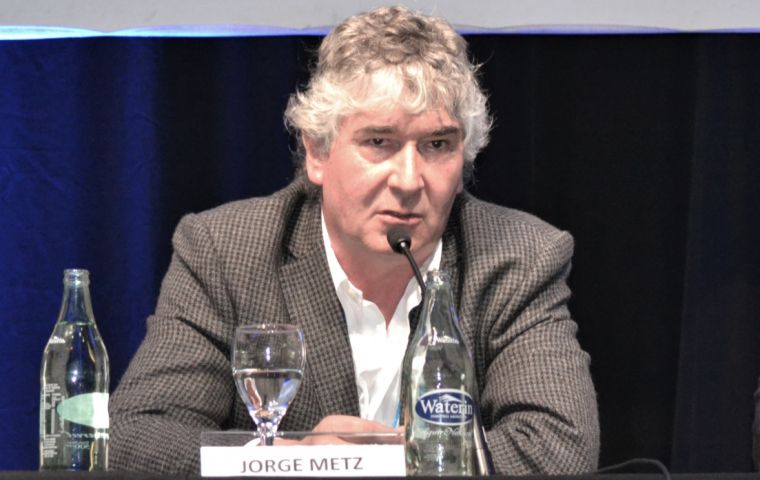MercoPress. South Atlantic News Agency
Argentina drastically slashes docking services to lower exports' costs
 “This will improve logistics costs and market transparency. It is one more step that will allow the port sector to keep growing,” said ports' official Jorge Metz
“This will improve logistics costs and market transparency. It is one more step that will allow the port sector to keep growing,” said ports' official Jorge Metz Argentina has set a maximum rate paid for port docking and undocking services, the government said in its official gazette, a change the Transportation Ministry said would slash docking costs by up to 40%. The move comes as President Mauricio Macri seeks to lower the cost of exporting food from the world’s No. 3 soy and corn exporter and the leading shipper of soybean livestock feed.
Maximum rates will decline between 20 and 40% under the new rules.
“This will improve logistics costs and market transparency. It is one more step that will allow the port sector to keep growing,” Jorge Metz, national undersecretary of ports and waterways in the Transportation Ministry, said in the statement.
Metz revealed that in November the cost of docking services in Rosario, the point of departure for 80% of Argentina’s agricultural exports, was about US$108,000 per vessel. That represents about 30% of each boat’s total port costs.
The government had previously reached a deal with the Rosario port’s stevedores union to accept competitive bidding for loading and unloading contracts, breaking a decades-long monopoly that resulted in elevated costs.
According to the Chamber of Port and Maritime Activities, the Rosario port complex - where large agricultural traders like Cargill and Bunge own terminals - receives some 2,500 cargo ships per year.




Top Comments
Disclaimer & comment rules-

-

-

Read all commentsIn response to all above, some clarification regarding the Argentine seaport system might be helpful ; by what I know, I am presuming that in the Argentine, the “Administracion General de Puertos” functions in a similar fashion as the Brazilian system does : the basic infrastructure of the port system belongs to the State Port Authorities and is the responsibility of the State, which in turn tenders out concessions to the private sector, to operate the marine terminals for periods of say, 20 or 30 years (to perform load/discharge ops, drayage, on/off dock storage etc).
Jan 22nd, 2018 - 06:09 pm +4The act of slashing (the obviously overly expensive) port costs in this case, as the article says, refers to the docking/undocking of the vessels, and the decision to do so was taken as a result of “a decades-long (State) monopoly that resulted in elevated costs” ; these specific costs are charged by the State, so slashing them does not affect the marine terminals, operated by the private sector, and where free-market principles prevail. Under this system - State-owned ports and private concessions - only the private sector has an incentive to be competitive, while the State Port Authority has the monopoly on all other services, so in the end, it’s just a matter of reducing costs charged by the State, benefiting exporters/ importers / consumers.
And referring to an above remark, that ”Setting a maximum price for (ex)port services leaves a lot of extra money in the pockets of the few...”, is completely WRONG...cutting docking costs (port fees) leaves LESS money for the State to squander, leaves MORE money in the pockets of those who are actual service providers, and makes Argentine exports/imports cheaper for the consumer.
In my experience - as a carrier - negotiating the terms of stevedoring contracts etc, with the terminals, is quite competitive....depends what you have to offer the terminal (“x” TEU's per week ?)...that's what a free-market is all about, offer & demand.
An authoritative answer indicating (as usual) that the brainwashed socialist Twinkle turnip doesnt have a clue...
Jan 22nd, 2018 - 08:24 pm +4@Think
Jan 23rd, 2018 - 03:52 pm +4Thanks for downgrading my post...just shows how little, if anything, you and couple of others on here, know about how ports work..or simple economic principles. Obviously no use trying to enlighten you.
@DT
Just for further clarification referring to port services, the carriers have the right - usually foreseen in stevedoring contracts with the terminal - to renegotiate the terms every now and again, when prices charged are thought to be no longer competitive, or not in line with the market. The 'bother” to renegotiate can be result in big savings for the carriers, as well as the shippers who use their services. And eventually the consumer, at the end of the chain.
Commenting for this story is now closed.
If you have a Facebook account, become a fan and comment on our Facebook Page!